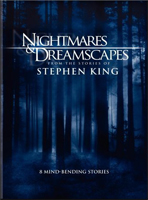 BUY IT AT AMAZON: Click Here
BUY IT AT AMAZON: Click Here
STUDIO: Warner Bros.
MSRP: $39.98
RATED: TV-PG
RUNNING TIME: 378 Minutes
SPECIAL FEATURES:
•Various Featurettes
The Pitch
“It‘s Masters of Horror (but without all the unwarranted false bravado) meets Are You Afraid of the Dark."
The Humans
A cavalcade of stars, including (but not limited to), Steven Weber, Kim Delaney, Claire Forlaney, William H. Macy, Jeremy Sisto, Tom Berenger, Samantha Mathis, Ron Livingston, Henry Thomas, Richard Thomas and William Hurt.
The Nutshell
A bunch of Stephen King’s short stories (from both Nightmares & Dreamscapes and Everything’s Eventual) are given the screen treatment and compiled for an Anthology-Type series on TNT.
The Lowdown
Battleground
The first offering in the set, Battleground is also the least engaging. William Hurt stars as a hitman who is apparently hired to kill a toymaker and steal a little trinket from the dead guy’s office. When he arrives back home, he is greeted by a package of little green army men, but, what’s this? They’re alive! Or, something similar to that, and they attack our hero, turning his uptown apartment into the titular locale.
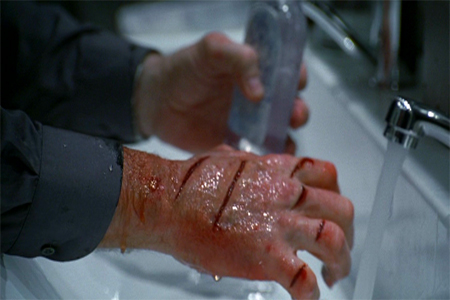
True Story: I got a very similar injury playing "war" as a kid. I don’t have some clever interjection or connection to make with this episode or image, but I do have a wicked-cool scar.
On a purely superficial level, Battleground looks like a load of fun. Until you realize that it’s been done. Maybe not to the violent extreme of what’s offered here, but violent or not, it’s completely unoriginal and, while taking an existing concept and reworking it isn’t inherently bad, you have to add something new. You have to offer something the audience can’t get anywhere else, and shallow violence just doesn’t cut it. Technically, it’s extremely well-produced and Hurt turns in a nice performance considering, but it just comes up short. Almost boring, even.
Crouch End
Next on the list is Crouch End, a “Travelers Beware” story that introduces us to a young newlywed couple on their honeymoon in London. They’re invited to a dinner party in a little suburb and, despite the warnings of the locals, decide to go. Soon after, they find themselves trapped in a Lovecraftian nightmare of illusion and warped reality.

It was then that they realized they had built their church on one of the biggest oil deposits in the world.
For the second time in a row, we have a concept that looks great on paper (which is ironic considering these are all based on literature – but, as I’ll mention several times throughout this review, I haven’t read many of the original stories these films are based on, so I unfortunately have no basis for comparison, but I digress…) but seems to have been jumbled in the execution. It starts off strong, too. Our couple is clearly in love and their chemistry is radiant. The only problem with this is that it does sort of telegraph what’s going to happen, at least insofar as that our couple is going to experience some sort of separation. But, keeping a positive outlook and all, you could also say it provides a healthy sense of foreboding. However, where Crouch End crosses the dividing line between a well-constructed short film and a spoon-fed piece of obviousness is the warnings. Cab Drivers refusing to take them to Crouch End, an 8-minute (possible exaggeration) exposition piece in the very middle of the show that tells exactly what Crouch End is, what happened and, most probably, what will happen to our lovely young married couple. Again, not a problem in and of itself, but all this is revealed before our couple ever sets foot in the town. After this huge revelation, the fact that they proceed is extremely unbelievable and ruins the rest of the show. And then when you consider the fact that so much time was devoted to exposition and some things were still vague and blurry, it doesn’t lend itself well to the idea of it being intentionally ambiguous, it just seems like the script was mishandled. Which sucks because this is an episode that had great potential – good characterization, great atmosphere – but in the end they dropped the ball.
Umney’s Last Case
You know how, when you watch football, if a certain receiver drops two passes in a row you’re not all that excited when a third gets tossed his way? That’s how I felt going into Umney’s Last Case, the third installment of our little series here. In fact, the first time I tried to watch it I fell asleep. I’m glad I gave it a second chance though, but more on that later. Last Case deals with 1930’s Private Eye Clyde Umney. We’re introduced to the people and places that make up his world and follow his cartoonish antics up until the day where everything is turned completely upsaide down. This also happens to be the day that Clyde meets Sam Landry – Umney’s creator. See, Landry’s an author and Umney is his biggest character. It’s revealed that Landry has faced some serious tragedy in the real world and has decided to switch places with Umney, hiding in the make-believe world he created and sending Clyde to 2005 to deal with the unpleasantness of Landry’s real life. It’s an outlandish plot and, given the previous bungles with relatively straight-forward supernatural thrillers that came before this, it’s not hard to let your expectations drop significantly.

Home Depot Commercial, directed by Michael Bay
But man oh man did this deliver. What we have is a double-sided story with two completely different complexions, joined by a transition that, a silly green-filter effect aside, is seamless and beautifully woven in. Once we follow the transition down into the proverbial rabbit-hole, what was an amusing, if not a little creepy, period piece becomes a haunting, powerful, downright tragic story that offers up commentary on so many facets of life (and beyond) without getting preachy or trying to beat you over the head. There are the usual observations on grief, guilt and running away from reality, but I also like the idea of giving a writer a sort of God-complex, taking a character’s world and shaking it all to hell for no other reason than to fuck with the character, before ultimately kicking him out of everything he’s ever known. It’s a nice “What if God was one of us” type of thought-process that adds yet another layer of complexity to an already deep and thoughtful examination of humanity.
The End of the Whole Mess
Batting cleanup with two outs and one man on, Mess is a story about good intentions gone bad. Like, really bad. We’re introduced to Howard Fornoy, a documentary filmmaker who tells us the story of his younger brother Bobby. Bobby was a genius who happened upon a cure for basic human meanness. The end of violence, the end of war, the end of aggression – basically, well, the end of the whole mess. Of course, there are some consequences.
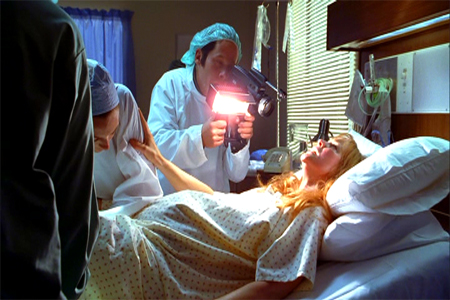
You know how, when you watch home videos of childbirth, the woman is always shouting obscenities at the husband holding the camera? Well this is why.
A lot of people really responded to this entry and some even claim it as their favorite. I guess I can see why, but it just didn’t resonate that well with me. I think the problem is that it really resembles the old “Monkey’s Paw” story, except that the ironic twist in the end is replaced by a random consequence that just comes out of left field and doesn’t really do anything to serve the story or tie anything together. It feels like an option on a dartboard that just got lucky enough to get a hole punched in it. Mess essentially equates to another case of something I’ve seen done before and done better. Even The Simpsons’ spin on the story was a little more well put together. That’s not to say I hated it though. The performances ranged from good to great (especially Livingston’s) and the narrative structure was nice and creative, but in the end it’s just an inferior attempt at a classic story.
The Road Virus Heads North
Richard Kinnel (Tom Berenger) is a famous mystery writer who’s facing some potentially serious health problems. On his way home, he stops at a yard sale and picks up a twisted little painting, created by a young man who’d recently killed himself. Turns out the painting is a little more than just that and soon Richard finds his grip on reality slipping.
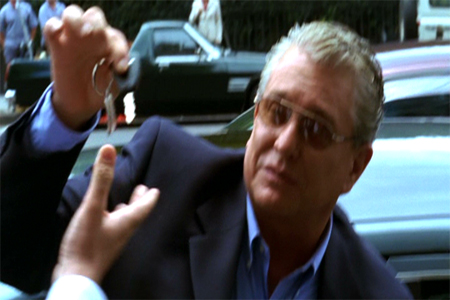
"Oh, you want your keys? You want your keys? Here they are…WHOOP! Hahaha…gotcha. Oh quit crying…"
This is the first, and may be the only, entry I just flat out didn’t get. And to be honest – I don’t think it’s my fault. The painting that anchors the story feels like it’s symbolic of something, but what? The obvious answer (and the answer that Berenger gives in his little EPK interview) is that the painting is a metaphor for Kinnel’s health situations. And if that were the case it would work fine (except for the fact that the painting kills the people Kinnel comes in contact with, which doesn’t make sense), but the script makes a point to explicitly state that that’s not the case. Which really makes me wonder why Berenger said that in his interview. I did ask someone who has a better grasp on these things than me, but his response was that the painting was just possessed and Kinnel just happened to be a victim of it. That helps explain why the painting kills Kinnel’s friends, but in the end just feels way too random to be the answer. If it is indeed the intention, why spend so much time focusing on Richard’s disease? Why call it “The Road Virus Heads North,” even further cementing the tie between the painting ad Kinnel’s health? It’s odd and sparse and is probably my least favorite in the series.
The Fifth Quarter
The only straight-forward drama in the series, Quarter is the standard “Convict wants to go good but gets pulled into one more deal” scenario. It’s also a treasure hunt story involving a treasure map split into four quarters and features a fairly blatant rip-off of Disney’s Pirates of the Caribbean ride. Jeremy Sisto stars as our “hero,” whom after ending an 18-month stretch in the pen, comes home to his wife and son ready to start a new life, only to find that one of his cell mates (and best friend) who had gotten out before him got involved in a rather lucrative heist and was subsequently shot in a big to-do over his quarter of the map. Tempted by the rather large amount of money and fueled by revenge over having just watched his buddy die in his living room, Sisto sets out to get payback, as well as a little payoff, from the other three guys.
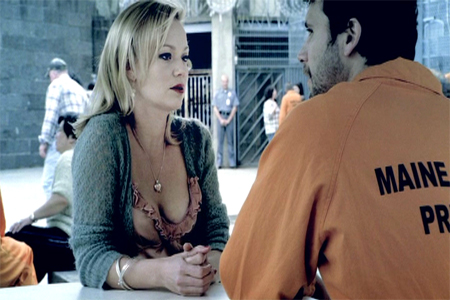
Yeah there’s dialogue going in here but I’ll be damned if I’m paying attention.
And what follows is half an hour of clichés, by-the-book formulaic elements, manufactured drama and (aside from Sisto’s) phoned-in performances. Which is alright, I guess. It’s watchable – if not way too familiar, but what really tips the scales against this episode is the ending. After his run as Super Criminal, Sisto gets all the quarters of the map and gives them to his wife, who figures out the puzzle with the most random, easy-way-out plot device imaginable. And then Sisto goes back to jail – which isn’t surprising considering he did enough dirt in the last half hour to end up with life, but as he sits in his cell he smiles. Why? He doesn’t know his wife figured it out, making them instant millionaires. He didn’t get away with anything. Why is he smiling? I’ve thought and thought about it and it’s driven me to the point of sheer aggravation. I finally gave up and watched Running Scared, which is a MUCH better telling of a similar story.
Autopsy Room Four
Another story without a supernatural or mystical bent, Autopsy is about a man who, after being bitten by a snake with paralysis-inducing venom while searching for his golf ball, looks very dead (even pronounced as so) but is in fact very much alive. As he lays on the slab he slowly discovers that he’s about to witness his own autopsy first hand (sounds like fodder for an Eli Roth story).
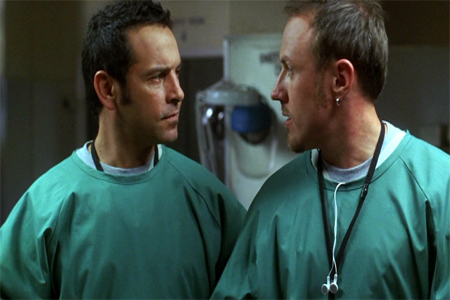
"I’m PC Virus Software." "Yeah? Well I’m MAC Virus software." "But you’re not doing anything." "Exactly."
Hey! Here’s something new – I actually DID read this one. And it freaked me out. So much so that I stopped buying expensive golf balls, alleviating my need to venture into the woods searching for them if they weren’t readily visible from the edge of the fairway. At any rate, because of the impact the story had on my real life (well, my golf game, anyway), I was looking forward to this episode, hoping they were able to translate all the tension and dread that jumped off the page. Good news, kids – they did. Almost every frame of this was superb (save for some hand-holding flashbacks that seemed a little superfluous). What makes this story so gripping is the first-person narrative. From the start, we fade in with Howard Cottrell’s point of view (as we see the body bag zipped up around us, which does a good job of setting the tone) and walk with him through confusion, discovery and the resulting panic. Richard Thomas’ performance is spot-on and keeps the viewer in his shoes the entire time. We’re like his Elliot, in that we feel what he feels. I honestly have nothing bad to say about this episode and I don’t wanna cross the line from positive review into masturbation, but this is genuinely a great episode that hits all the right notes and, even though it’s nice to have the literary version to cross-reference, it’s not a pre-requisite and is just as engrossing and chilling as a standalone hour of television. Good stuff, indeed.
You Know They Got A Hell Of A Band
Bringing up the rear in this little collection, Hell of a Band concerns a couple on vacation and the perils of not asking for directions. After a few wrong turns, Clark and Mary (Steven Weber and Kim Delaney) find themselves in a small town called Rock and Roll Heaven, which isn’t as clever a name as it sounds (wow, they should hire me to write for the back of the DVD Cases. Or not, ya know, whatever.).
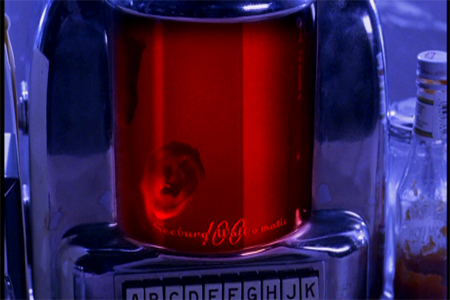
Seeburg’s "Lend us your ear" campaign was indeed inspired, but man-oh-man did they bungle the marketing campaign.
When Nick wrote his standalone review of this episode, he said “I liked this story when it was printed, partially because a part of me wishes it were true that the rock stars who died too young had a second chance, zombie side effects notwithstanding…. Plus, the idea was so disrespectful and respectful towards the dead at the same time that the whole thing was just fun to watch unfold.” And I completely agree with that (yeah – I read this one as well way back when) – not only for the Rock Star angle, but for the whole Bermuda’s Triangle aspect and the possibility for an examination of gender dynamics, this thing was ripe for total greatness. But something got way lost in the translation. First of all, the town looked straight out of color-restored Pleasantville, which doesn’t make a whole lot of sense given the inhabitants, (well, excluding Ricky Nelson) as it seems like it should look a little dirtier. Maybe a little more, I don’t know, ostentatious. It was definitely creepy, but it looked like it was a discarded set piece from the “Black Hole Sun” video, which, for me, just doesn’t work. The hippy school bus was a great touch and it seems like they should have used a little more of that inspiration when designing the town. But, even above and beyond the aesthetics, the performances weren’t really all that appealing either. The actors playing the rock stars seemed to be straight out of community theater and their performances looked to be bad impressions of bad impressions. Obviously, it’s an hour long episode in which the first 30 minutes is devoted to two-character set-up, so I’m not expecting bio-pic type of character portrayal, but they could have been a little more, I don’t know – meatier. Same goes for our leads – for a married couple they had absolutely zero chemistry and frankly – they seemed to really dislike one another. And that would have been fine had it been established they were having problems before the trip, and the whole “town possessing Clark” angle would have worked had he not been a complete jerk well before they even got to Rock and Roll Heaven. But, even after all of that, I think the biggest problem is that writer and director Mike Robe also agreed with Nick – and left it at that. I imagine someone asking him what the story was about and his answer being “It’s about a town full of dead rock and roll stars!“ and forgetting that he also has to deal with even the most basic elements of characterization, let alone anything deeper. He let the gimmick be the lead character here and, while it is a great concept at its foundation, it’s just not enough to carry an entire hour of television – especially when that “character” doesn’t make its appearance until the last half hour. And I’ve wasted enough HTML on this.
At the end of the day though, the few bad apples aside, this was a pretty good set. It did miss a few beats (with Hell of a Band being the only spectacular miss – the rest were still somewhat watchable), but when it was on, it was dead-on. Definitely not a set I feel bad having on my shelf.
The Package
Starting (as I always do) with the artwork, I gotta say – I love it. The title logo on a blue-tinted forest background with a sort of holo-foil (is that right) reflective surface that gives it a subtle rainbow-ish look in certain angles. Being as blue is my favorite color, I am slightly pre-disposed to liking it, but even if I wasn’t I’m sure it would look just as sexy. With a set like this, covering so many moods and tones, I could really see this getting all cluttered up, but the minimalist design was the perfect choice. Not to mention the glorious use of real estate, with the two slimline cases inside being used for the different individual episode synopses. Thumbs up to you, art guy.
Feature-wise, it would seem they went for quantity over quality, filling each disc with several little interview futurities that are all shamelessly short little bursts of cast and crew fellatio for Mr. King. Typical EPK stuff – the stuff they probably used as filler in extended breaks on TNT to promo the series. To make it worse, they recycle a lot of stuff – soundbites and what not, which gives the illusion of a lot of unique and specially-created material, without having to deliver. That kind of leaves us with a weird sort of anti-quantity-over-quality. I almost would have preferred it had it been released completely feature-free.
OVERALL 7.0 out of 10